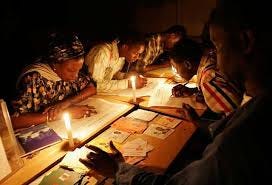“Will Trump Help the Third World Reject the Climate Political Correctness the West Wants to Impose on Them?”, Guest Post from Vijay Jayaraj at the CO2 Coalition, THOMAS J SHEPSTONE
“Nowhere will a change in dynamics of energy policy be more welcome than in developing nations whose imperative to increase access to energy conflicts with pressures to submit to Western climate lords
Will Trump Help the Third World Reject the Climate Political Correctness the West Wants to Impose on Them?
FEB 21
Guest Post from Vijay Jayaraj at the CO2 Coalition
President Donald. J. Trump’s seismic shift in energy policy will be felt far beyond U.S. borders. His withdrawing from the Paris Agreement, expanding American oil and gas exports, terminating the Green New Deal and eliminating the prospect of carbon tariffs offers a lifeline todeveloping nations grappling with chronic energy poverty.
When the United States pivots sharply, other nations reassess their positions. Nowhere will a change in the dynamics of energy policy be more welcome than in developing nations whose imperative to increase access to energy conflicts with pressures to submit to Western climate lords’ anti-growth, anti-humanistic, and dystopian Paris climate agreement.
Many developing nations have long expressed frustration with the climate agenda’s constraints on their economic growth. India and China, for instance, have consistently maintained that they need flexibility to determine their own domestic energy mix, emphasizing that access toaffordable fossil fuels is crucial for lifting millions out of poverty.
Similarly, nations across Africa have argued that their development priorities must include utilizing their natural resources – including coal, oil and natural gas – to meet people’s basic needs.
Take Nigeria, for example. With its significant natural gas reserves, the country has been caught between international pressure to limit the use of hydrocarbons and the urgent need to provide electricity to its growing population. International financial markets friendlier to fossil fuels could accelerate Nigeria's plans to monetize its natural gas resources and expand domestic power generation.
As Yemi Osinbajo, a former Nigerian vice president, said, “Africans need more than just lights at home. We want abundant energy at scale so as to create industrial and commercial jobs. To participate fully in the global economy, we will need reliable, low-cost power.”
Global Implications of U.S. Energy Expansion
One of the most notable effects of Trump’s energy policy is an anticipated surge in exports of liquefied natural gas (LNG) from the U.S., which is to resume processing permit applications for new LNG projects interrupted by former President Biden.
For developing countries, this means reliable energy at competitive prices – a stark contrast to the intermittent power of solar and wind projects that have been favored by climate-compliant financial institutions.
Energy poverty remains a crippling obstacle in many parts of sub-Saharan Africa, South Asia and Latin America. According to the InternationalEnergy Agency (IEA), nearly 800 million people worldwide are without electricity, while 3 billion rely on smoky biomass for cooking.
By moving to increase the global supply of LNG, Trump offers an avenue for these nations to transition toward cleaner-burning natural gas. Benefits will include less deforestation, less indoor air pollution and a chance for more economic growth.
India has already invested in LNG terminals in the U.S. and will be increasing imports as demand grows from its population of 1.4 billion.
Moreover, an increased supply of LNG will stabilize global reserves and reduce the vulnerability of energy-importing nations to geopolitical disruptions. Energy abundance is a prerequisite for stability and prosperity – a reality that developing countries know all too well and the climate obsessed seemingly undervalue.
No Carbon Tariffs: A Boon for Developing Economies
While many pundits harp on Trump’s proposed tariffs on imports, they don’t recognize – or at least fail to acknowledge – that many in the developing world are likely to be happy that carbon tariffs of the climate agenda won’t be part of Trump’s tax regime.
Carbon tariffs, a darling of the climate crowd on both sides of the Atlantic, are designed to penalize the producers – and users – of carbon-intensive goods. In practice, however, they act as a regressive tax on developing nations, many of which lack the financial and technological means to “decarbonize” their industries.
For countries like India, which Foreign Minister S. Jaishankar has argued must prioritize economic growth over rigid climate targets, the carbon tax-free future represents a much-needed reprieve. It levels the playing field, allowing developing economies to compete in global markets without bearing the disproportionate burden of forced emissions reductions. Yes, Trump has threatened other tariffs, but those can be resolved through diplomacy.
Fossil fuels still account for over 80% of the world’s primary energy consumption, with countries like China, India and Indonesia expanding their infrastructures to produce, import and use hydrocarbons despite pledges to meet impossible climate goals.
With Trump’s bold move, these nations will no longer feel the need to hide behind the veneer of climate appeasement.
Trump’s rejection of climate orthodoxy matches the aspirations of developing nations striving to ensure energy security and overcome poverty. Expect these countries to be emboldened to more openly pursue their preferred energy strategies and leave the Paris agreement themselves.
This commentary was published at Real Clear Energy February 20, 2025.
Vijay Jayaraj is a Science and Research Associate at the CO2 Coalition, Arlington, Virginia. He holds an M.S. in environmental sciences from the University of East Anglia and a postgraduate degree in energy management from Robert Gordon University, both in the U.K., and a bachelor’s in engineering from Anna University, India.








